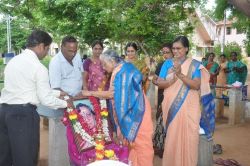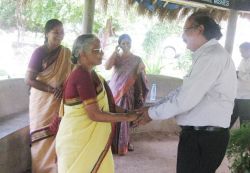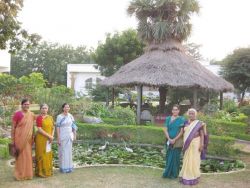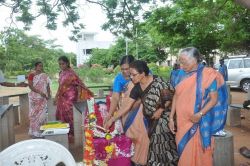Evolution
The journey of our founders in their endeavour to establish, develop and sustain a good educational institution started with taking up a 1 year Montessori Education methodology training program in an International training centre run by Dr. Maria Montessori's representative, Mr Justin, a Dutch national.Montessori teaching methodology has been designed in a play way method with the idea that educating kids requires the system to be in accordance with the child's age. It is completely different from the traditional method where children are seated in their chairs and the teacher teaches.
Guide the child to help himself. Bring out and develop the inherent skills, abilities and capabilities in children. - Maria Montessori
Dr. Montessori opined that the responsibility of the teacher is only to provide guidance to the child to become brave enough to be able to accomplish all the tasks that they can handle at that age in their day to day life with self confidence. That is the reason she designates the person guiding the child to be a director rather than a teacher.
It is easier to build strong children than to repair broken elders. - Frederick DouglassDr. Manga Devi having worked with faith in this ideology for over 30 years, has developed a unique system for early childhood (pre-primary and primary) education. The system takes the environment as the mainstay for lesson plans. The syllabus needed to impart knowledge in fundamental aspects has been evolved over a long period of time with the tools for learning extracted from the surrounding environment itself and is refined based on the environment in which it is implemented.
It excludes the traditional monotonous methodologies of learning like, repeated tracing or overwriting of alphabets and digits on slates with chalks, memorising or byhearting, copy writing, school bag, text books, home work and examinations.
This system is implemented in the primary sections of Ushodaya English Medium School as well as in Nandana Telugu Medium School for Child Laborers. Because they differ from the formal learning system, they are segregated into separate units, naming them Ankur (english medium) meaning initial stage and Chiguru (telugu medium) meaning sprouting or young leaves.
Facility
Class rooms are designed as large halls to enable the teachers to work along with the kids in their pursuit. The interior of the room looks colorful with wall paintings. Racks are built into and arranged along walls to provide for space to store the various learning equipment.The seating arrangement does not take the formal tables and chairs or benches mode. Chairs in various colors are stacked along the edges of the room to leave the room free for conducting various activities. Tables made of light wood, in various shapes (square, rectangle, hexagon, circle) can be dismantled and put aside. They are arranged as and when needed with chairs around them.
Black boards around the class room, at a height accessible to the children to enable them to write on them.
Class rooms are also equipped with learning material like flash cards, small dishes in various colors, frames with cloth flaps, wood slates with pores, equipment required for conducting activities like puppet shows, masks for role plays.
Activities
The regular activities conducted are different compared to the formal class room activities, achieving the same objective though. On a first glance it would seem to be a large room with a number of kids working and the teachers working along with them.The various activities that the child gets involved in are grouped into sets with each set accomplishing a certain objective in their learning process.
Exercises of Practical Life
Children feel inquisitive about everything they come across and show a strong desire to handle things they encounter in day to day life just like the elders do. Children are not given an opportunity by elders at home either out of their affection (let me do it for you feel) or fear (no you will get hurt or drop it or spoil it).
The school provides an opportunity for the child to get a taste of such activities taking adequate care to ensure that the tools used are all kid safe. It is not just for joy. Allowing the child to do so benefits the child in the form of improved concentration, greater muscular coordination.
The activities that the children get to try out at school are :
- Clearing and cleaning their surroundings (includes sweeping).
- Filling water into bottles with funnels.
- Pouring water from one glass into another
- Making roti
- Weaving colored Jute fabric into plaits by braiding
- Fastening garments with buttons, zips and hooks
- Tying shoe laces
- Polishing shoes
Expression
Ability to express oneself is one of the foremost skills that is needed for a being. What better tool to improve this skill in a child than a theater. The forms of theater that are used are- Puppet shows, where a few kids conduct by making puppets move within a frame the show and the rest of the kids act as spectators for the show.
- Shadow play, where shadows are used to tell a story. Story telling through role play
- Role play, where children wear masks to act a role of some animal and then act out a small story involving the animals.
Sensory Skills
Our senses are the input tools for us. Active sensory system aids in improving the grasping ability of children. Various activities are designed to ensure enough exercise for all the senses.The sensory material includes color tablets, sound boxes, touch tablets, elements identifiable by smell and taste. Our system tries to develop sensory exercises that would aid formal learning of the three R's whose importance cannot be ignored.
Children are blindfolded and made to identify alphabets and digits by touch using cards on which letters are painted.
Learning a language is what the children at an early age enjoy the most and feel less burdensome. We use a unique phonetic method to teach language (letters, words and sentences - no writing). Though, learning seems to be a bit slow under this method, children will be able to write words and sentences (which they perceive as pictures).
The extraordinary aspect being that children who can write words and sentences do not know all the alphabets and more so in an order. One will have to see this to believe it.
Equipped with his five senses, man explores the universe around him and calls the adventure Science. -Edwin Powell Hubble
Learning through drawing
A unique system that has been developed by Dr. Mangadevi to channel children's love for doodling into some activity that would aid their learning process.On the blackboard (low enough to be accessible to small kids), children get a slot each of their own for some time every day. Unlike in formal schools where only the teacher gets to write on the board, the children here with the various colored chalk pieces they are provided with, can write, draw or scribble whatever they want.
Teachers use the upper part of the board which is not accessible to the children to provide some sort of assistance by placing drawings or drawing pictures, words, sentences etc that the children may use for replicating on their part of the board.
This activity helps the children by strengthening the muscles on the fingers and giving them a hold on their finger movement. It also improves their concentration and builds self confidence in them. They get a lot of joy and satisfaction through this activity.
Experimenting
Men love to wonder, and that is the seed of science. -Ralph Waldo Emerson
Everything around us is wonderful and as we grow the number of things that awe us keep growing. We try to implant interest in science and experimenting by showing processes that children encounter in day to day life and which they can comprehend, practically. It is not just a demonstration but an activity that is carried on by the children and teacher together.
The most exciting phrase to hear in science, the one that heralds the most discoveries, is not "Eureka!" (I found it!) but "That's funny..." -Issac Asimov
Art and Craft
We encourage and guide children into making something useful or beautiful from all kinds of wastes. Children get to spend some time of the week on this activity. The get to think out of the box to create utility to something that has already been written off as waste and of no value. Giving life to something dead. Isn't there joy in this?Arithmetic
Go down deep enough into anything and you will find mathematics. -Dean Schlicter
The most interesting thing that we identified in teaching mathematics, especially at the primary school stage is that, the learning experience can be enhanced by integrating their learning with nature. Since most of the learning involves counting, flowers, leaves, seeds, chips and pieces of wood, beads, colored stones etc form the items that are used for counting.
Nature Walk
- Children go out of the class room environment for a stroll everyday for some time. We call it nature walk. They get to ask their teacher anything they wish to know regarding whatever they come across during the stroll. During the stroll they also pick up articles they use in their learning activity.They are provided different colored dishes and are asked to place articles of a kind into a dish learning grouping thereby. They use the same for their counting exercises also. The premises being full of trees, they get enough variety so as not to pick up the same things again and again.
Funds - Sources/Usage
The following costs/expenses are incurred.Costs/Expenses
Revenue
The revenue costs involved in running this entity include Monthly - salaries to teachers, support staff, electricity charges, building maintenance, ground maintenance; Annual - furniture repair and maintenance, building maintenance.Capital
Capital costs include expenditure incurred on making or buying teaching equipment, new facility construction.
Sources of Funds
Ankur being a self financed entity, the funds required for running the same accrue internally from the fees collected from children.Our source of funds for running Chiguru (free school which is part of Nandana Grameena Patasala, a free school for child laborers) include contributions from the alumni of the two schools run by our parent organisation, the students and their parents studying at those schools, voluntary contributions made by individuals and organisations (one time as well as repetitive) and contributions made by the schools themselves.
It might not be out of place to mention that we do not receive any assistance from the government for the children mid day meal scheme or others. We try doing whatever we can with the resources we can pool up on our own.
You can Help
The english medium entity, Ankur, is a self financed entity.The telugu medium entity, Chiguru, is a free school and is a part of the Nandana Grameena School for Child Laborers, where, apart from education being free, children are also provided with uniform and free mid day meal. You may provide for the education of these children.

($ 260)


($ 220)


($ 125)


Amount



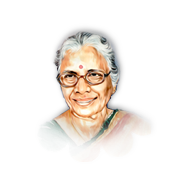
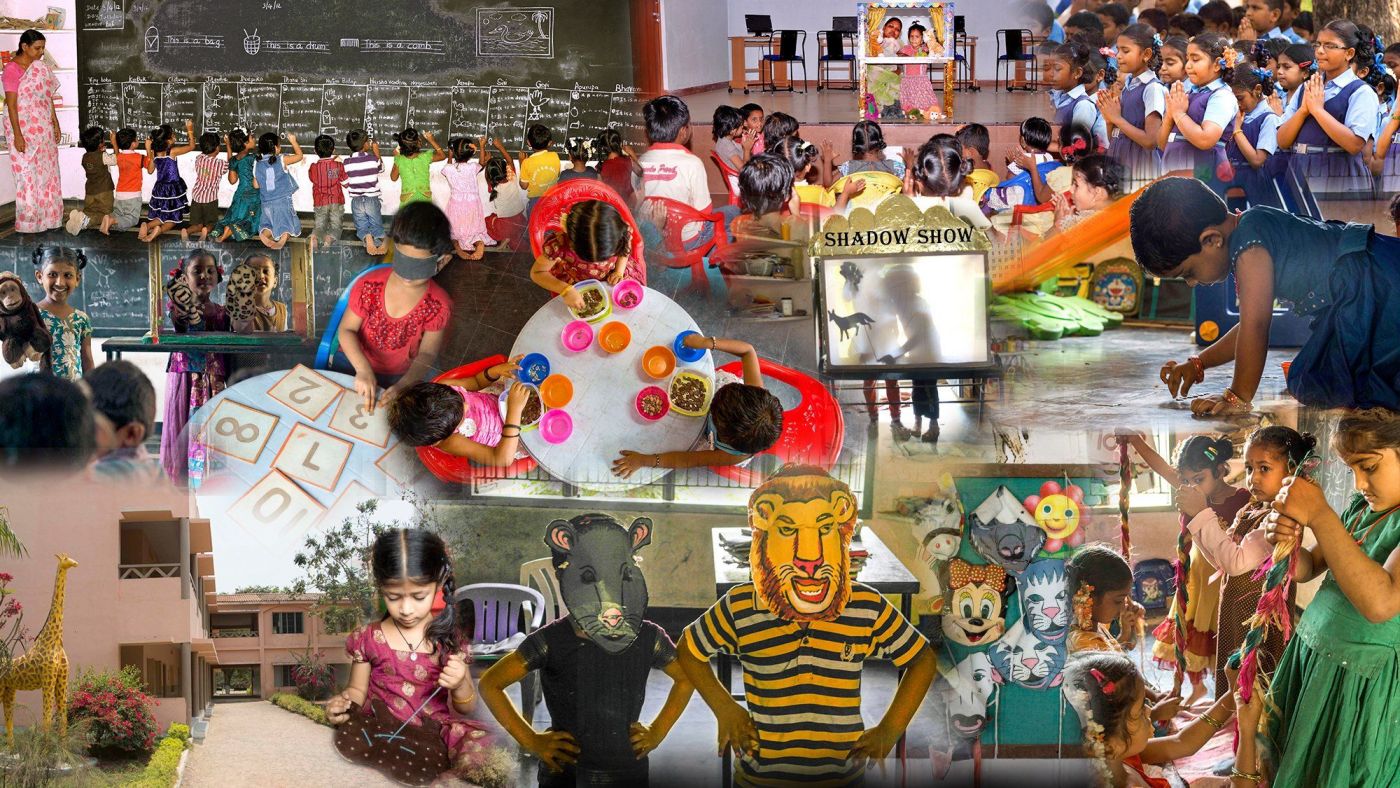
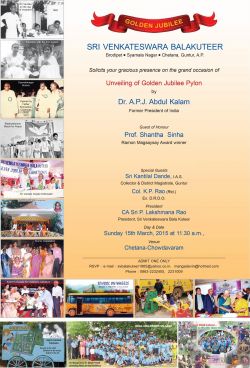 Golden Jubilee Celebrations
Golden Jubilee Celebrations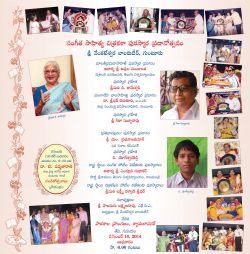 లలితకళా ఉతà±à°¸à°µà°‚ 2014
లలితకళా ఉతà±à°¸à°µà°‚ 2014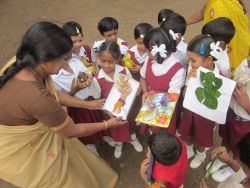 Eco Friendly Vinayaka Namo Namaha
Eco Friendly Vinayaka Namo Namaha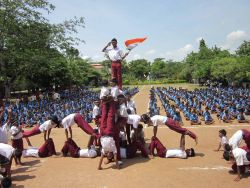 Independence Day Celebrations at Chetana
Independence Day Celebrations at Chetana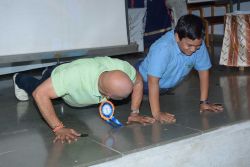 Workshop on Be the Change You can do it
Workshop on Be the Change You can do it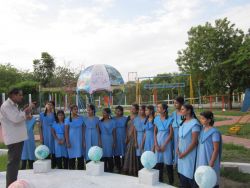 Visit by Professor SL Babu from Central University
Visit by Professor SL Babu from Central University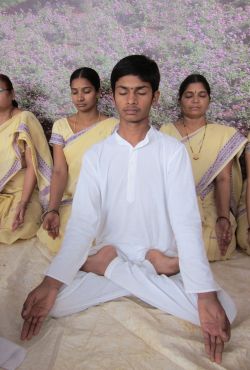 International Yoga Day Celebrations
International Yoga Day Celebrations